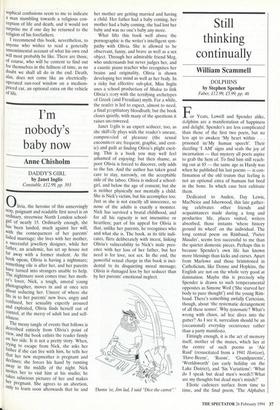I'm nobody's baby now
Anne Chisholm
DADDY'S GIRL by Janet Inglis Constable, £12.99, pp. 393 Olivia, the heroine of this unnervingly sexy, poignant and readable first novel is an ordinary, streetwise North London school- girl of nearly 15. Ordinarily enough, she has been landed, much against her will, With the consequences of her parents' failed marriage; she lives with her mother, a successful jewellery designer, while her father, an academic, has set up house not far away with a former student. As the book opens, Olivia is having a nightmare; something vile is after her, and her parents have turned into strangers unable to help. The nightmare soon comes true: her moth- er's lover, Nick, a tough, amoral young Photographer, moves in and at once sets about seducing her. Unsure of where she fits in to her parents' new lives, angry and Confused, her sexuality expertly aroused and exploited, Olivia finds herself out of Fontrol, at the mercy of adult lust and self- ishness.
The messy tangle of events that follows is described entirely from Olivia's point of view, and the book enlists the reader firmly nn .her side. It is not a pretty story. When, irYing to escape from Nick, she asks her father if she can live with him, he tells her that her new stepmother is pregnant and declines; she forces his hand by running a. vvoY in the middle of the night. Nick Invites her to visit him at his studio; he takes salacious pictures of her and makes her pregnant. She agrees to an abortion, only to learn soon afterwards that he and
her mother are getting married and having a child. Her father had a baby coming, her mother had a baby coming, she had lost her baby and was no one's baby any more.
What lifts this book well above the pornographic is the writer's intelligent sym- pathy with Olivia. She is allowed to be observant, funny, and brave as well as a sex object. Through her admirable friend Meg, who understands but never judges her, and a caustic piano teacher who recognises her brains and originality, Olivia is shown developing her mind as well as her body. In a risky but effective sub-plot, Miss Inglis uses a school production of Medea to link Olivia's story with the terrifying archetypes of Greek (and Freudian) myth. For a while, the reader is led to expect, almost to need, a final propitiatory bloodbath; but the book closes quietly, with many of the questions it raises unanswered.
Janet Inglis is an expert seducer, too, as she skilfully plays with the reader's unease, compounded of pleasure (the sexual encounters are frequent, graphic, and erot- ic) and guilt at finding Olivia's plight excit- ing. This is a book you may well feel ashamed of enjoying: but then shame, as poor Olivia is forced to discover, only adds to the fun. And the author has taken good care to stay, narrowly, on the acceptable side of the taboo. Olivia is indeed a school- girl, and below the age of consent; but she is neither physically nor mentally a child. She is Nick's victim, but his accomplice too. Just as she is not exactly all innocence, so none of the adults is exactly a monster. Nick has survived a brutal childhood, and for all his rapacity is not insensitive or heartless; part of his appeal for Olivia is that, unlike her parents, he recognises who and what she is. The book, as its title indi- cates, flirts deliberately with incest, linking Olivia's vulnerability to Nick's male pres- ence with her loss of her father, but her need is for love, not sex. In the end, the powerful sexual charge in this book is inci- dental to its disquieting moral message; Olivia is damaged less by her seducer than by her parents' emotional neglect.
'Damn 'ee, Jim lad, I said "Dice the carrot".'


























































 Previous page
Previous page